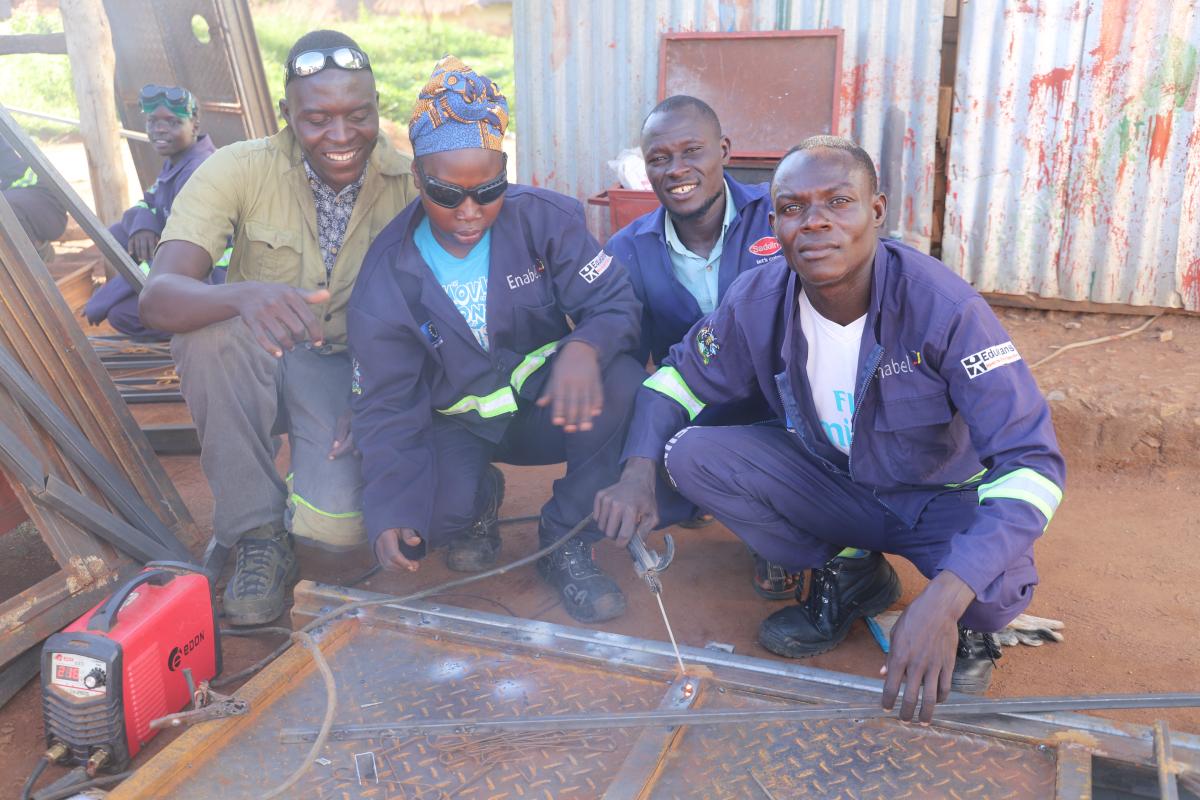Abuyi empowers refugees and host youths at his metal welding workshop in Uganda
Abuyi
Talibu, a 27-year old Ugandan male is a metal fabricator, whose metal welding
workshop is a hive of activity. A former trainee under the Support to Skilling
Uganda (SSU) project, Abuyi now mentors other young trainees, including
refugees in Yumbe district.
Training
young people from different backgrounds can pose challenges due to differences
but Abuyi says that so far, the trainings have gone well without any mishaps.
“All the trainees have been respectful of each other. I usually talk to them at
the beginning of the trainings to emphasize why they are here and I encourage
them to put any differences aside”, says Abuyi. He does not discriminate
against the trainees based on their countries of origin. Instead, he focusses
on the potential he sees in each of them and builds on it to empower them. He
trains them to fabricate sliding doors and windows, tank stands and gates,
among others. Abuyi earns 50,000shs (12€) per trainee per month.
Since
the establishment of the Excel Welding workshop, located along Koboko-Moyo
road, Abuyi has had the opportunity to train 2 sets of trainees. These are
placed at his workshop as interns by Edukans, an implementing partner of Enabel
under the SSU project. He was identified as a mentor due to his fast-growing
business and willingness to help others. He has so far mentored 16 youth, 11 of
whom are refugees from neighbouring South Sudan.
“70%
of the youth I have trained are refugees from South Sudan. I am very happy that
I am now a mentor and I am helping to change the lives of young people like me
through vocational skilling .I like
reaching out to the youth and helping them in any way I can because it is us
the youth who are the future of our country”.
Abuyi,
not only mentors interns but he is also an employer. He currently employs 4
youths, one of whom is a refugee from Piriri camp who started off as an intern.
“I retained him as an employee because he is hardworking and he has a positive
attitude towards work,” says Abuyi. He
is committed to changing lives because he has also benefitted from the
commitment of others who empowered him to own a business in Yumbe.
Yumbe district is one
of the regions significantly affected by the influx of refugees, primarily from
South Sudan. The district hosts multiple refugee settlements, including
Bidibidi, which is one of the largest refugee settlements in the world. Bidibidi alone accommodates close to 300,000 South
Sudanese refugees who fled conflict and violence in their home country. Various
NGOs, are actively involved in providing assistance and support to both
refugees and host communities in Yumbe district. Efforts are focused on
improving living conditions, providing education and vocational training
opportunities, and promoting self-reliance among refugees.
Abuyi has a diverse clientele many of whom
are refugees. He says that he has established a good relationship with them
which has in turn expanded his market through word of mouth referrals. Having a
large population of refugees in Yumbe is a good boost for Abuyi’s business
because they form a large part of his clientele since they are allowed to
build. In Uganda, refugees cannot own land, as with all
non-citizens. However, the Ugandan government allocates 50 square meters of
land to each refugee family that arrives in Uganda to live and grow food.
His future plans? “I want to register my
company so that I can be able to apply for larger contracts and attract more
revenue.” Abuyi also wants to train and employ more youth to curb the problem
of drug addiction which he has noticed among the idle youth within his
community, especially in refugee settlements. He is grateful for the peaceful
co-existence that he observes between the host community members and refugees
in Yumbe, which have in turn helped his business to grow.
The 'European Union Trust Fund' (EUTF) supports
the implementation of the Support to Skilling Strategy in Uganda. The project
aims at sustainably improving food security, nutrition, and livelihoods of the
refugee population. It focuses on
access to skills development and entrepreneurship guidance and services for
refugees and host communities in North-Western Uganda. So far, 1,187 youth, 60% of whom are refugees have been trained
since the inception of the project.
Dernières actualité de ce projet
Pas d'actualité

